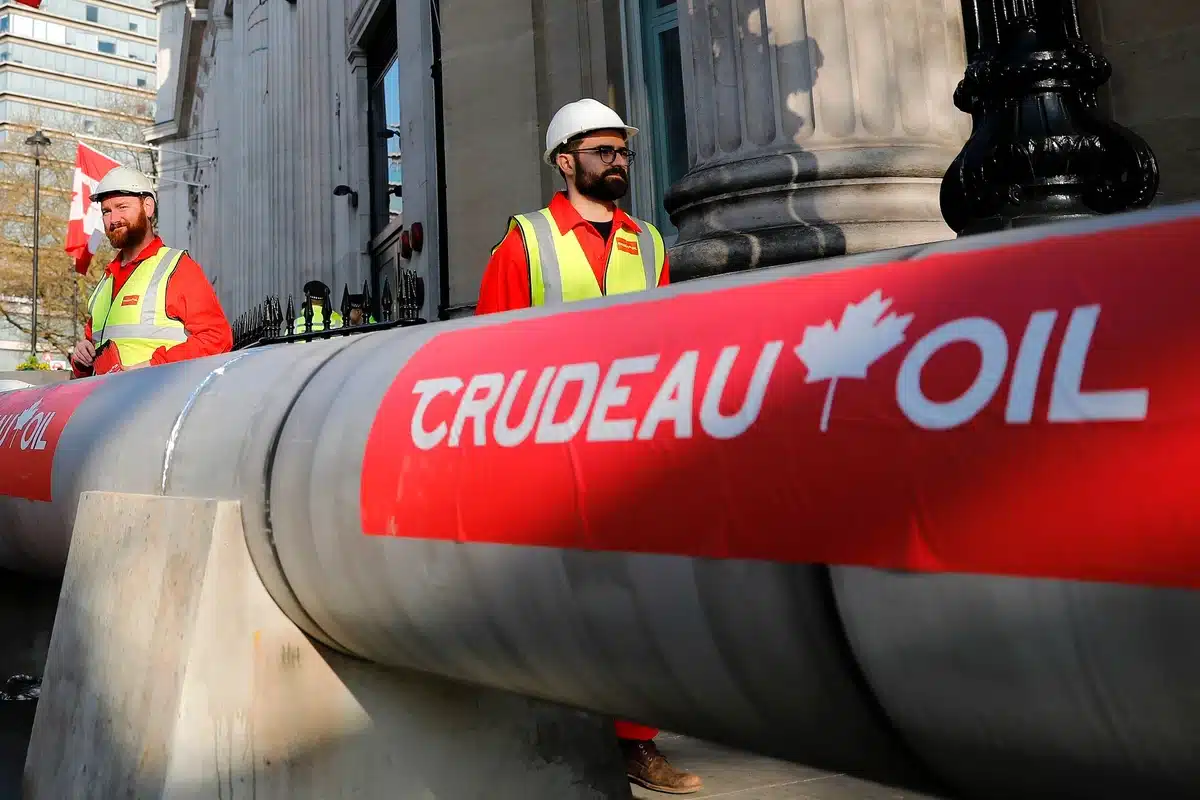News
Canada’s Trans Mountain Pipeline Starts Operations After 12 Years and $25 Billion

After 12 years and C$34 billion ($25 billion), Canada’s Trans Mountain pipeline expansion project (TMX) began commercial operations on Wednesday, a major milestone expected to transform access to global markets for the country’s producers.
Pipeline constraints have forced Canadian oil producers to sell oil at a discount for many years, but TMX will nearly triple the flow of crude from landlocked Alberta to Canada’s Pacific coast to 890,000 barrels per day (bpd).
For Canada, the world’s fourth-biggest oil producer, the additional pipeline capacity is set to boost crude prices, lift national gross domestic product and expand access to Asian oil markets.
Both TMX and the existing pipeline are now able to transport crude oil and the company has the ability to load cargoes from all three berths, Trans Mountain said in a press release, adding that 70% of the expanded pipeline is full by volume.
“Everyone has been waiting for this for literally years,” said Rory Johnston, founder of the Commodity Context newsletter. “It’s a fantastic thing for Canada and the Alberta oil patch.”
The expanded pipeline was first proposed by Kinder Morgan in 2012. The Canadian government bought it in 2018 to ensure the project got built despite opposition, but construction has been marred by regulatory delays and costs soaring to more than four times the project’s original budget.
“It is increasingly difficult to build pipelines in this country and it wouldn’t surprise me if this was the last pipeline,” Jon McKenzie, CEO of oil, said on an earnings call. The Canada Energy Regulator (CER) granted the final permits for the expansion project on Tuesday, clearing the way for the pipeline to start operating.
Trans Mountain Pipeline will boost Canada’s oil export capacity
Trans Mountain Corp said May 1 marks the commercial commencement date for the project, and tankers will be able to load at Westridge Marine Terminal in the Port of Vancouver by mid-May.
TMX will substantially boost Canada’s oil export capacity and could help shrink the discount on benchmark Canadian heavy crude, currently around $13.50 a barrel below U.S. crude, to less than $10 a barrel, analysts at RBC Capital Markets said in a note to clients.
Asian buyers are already showing interest.Reliance Industries bought 2 million barrels of Canadian crude from Shell for July delivery, marking the Indian refiner’s first oil purchase from TMX, Reuters reported.
For Ottawa, the project’s completion comes as a relief. Prime Minister Justin Trudeau’s Liberal government was slammed by environmental campaigners for buying the pipeline in the first place, and has drawn sharp criticism during construction for spiralling costs.
Green groups worry about the pipeline’s potential to leak in pristine areas and its expansion of carbon-intensive oil sands crude. Climate activists warn increasing oil and gas production risks hamstringing Canada’s efforts to cut carbon emissions.
“Trudeau made the decision to purchase this gift for the fossil fuel industry, but it’s these communities and ecosystems that will pay the price when the Trans Mountain pipeline inevitably spills,” said Peter McCartney, climate campaigner at the Wilderness Committee environmental group.
Canadian oil production
The federal government wants to sell at least part of Trans Mountain to Indigenous groups, but is expected to have to take a major haircut on its investment.
“The Trans Mountain Expansion Project will ensure Canada receives fair market value for our resources while maintaining the highest environmental standards,” said Katherine Cuplinskas, press secretary to Deputy Prime Minister Chrystia Freeland.
“The federal government will launch a divestment process in due course.”
Canadian oil production is forecast to hit a record high of around 5.3 million bpd this year, according to TD Securities, as producers ramp up output in anticipation of TMX’s new capacity.
Two traders in Calgary said oil inventories in Alberta are brimming at record levels of 42 million barrels, but expected to draw down reasonably quickly once the expanded pipeline starts flowing.
“The completion of TMX is monumental for Alberta, since this will significantly increase our province’s output,” Alberta premier Danielle Smith said in a statement on Tuesday.
Conservative premier Smith is a frequent critic of Trudeau’s Liberals but thanked the federal government for seeing the project through, and said stronger Canadian crude prices would result in many millions of dollars extra in government revenues.
Source: Reuters
News
Britain Must Be Ready for War in 3 Years, Warns New Army Chief

The new head of the Army has stated that Britain must be prepared to fight a war within three years.
Gen Sir Roland Walker has issued a warning about a variety of risks in what he calls a “increasingly volatile” environment.
However, he stated that war was not inevitable and that the Army had “just enough time” to prepare to prevent conflict.
He stated that the Army’s fighting capacity would be doubled by 2027 and tripled by the end of the decade.
Gen Walker warned that the Britain was under threat from a “axis of upheaval” in his first speech as Prime Minister on Tuesday.
Among the primary concerns confronting the Britain in the next years, as noted by the general in a briefing, is an enraged Russia, which may seek vengeance on the West for helping Ukraine, regardless of who wins the war.
He stated: “It doesn’t matter how it finishes. I believe Russia will emerge from it weaker objectively – or completely – but still very, very dangerous and seeking some form of retaliation for what we have done to assist Ukraine.”
Britain’s Government Defence Review and Military Challenges
He also warned that China was determined to retake Taiwan, and Iran was likely to seek nuclear weapons.
He stated that the threats they posed may become particularly acute in the next three years, and that these countries had formed a “mutual transactional relationship” since the war in Ukraine, sharing weaponry and technology.
However, he stated that the path to conflict was not “inexorable” if the UK re-established credible land troops to assist its deterrent strategy for avoiding war.
In his speech, he described his force of slightly over 70,000 regular troops as a “medium-sized army” and made no direct call for additional resources or men.
However, he pushed the British Army to adapt swiftly, focussing on technology such as artificial intelligence and weaponry rather than numbers.
His ultimate goal is for the Army to be capable of destroying an opponent three times its size.
This would entail firing quicker and farther, he said, aided by lessons learnt from the Ukraine war.
The general’s speech at the Royal United Services Institute land warfare conference comes only one week after the government began a “root and branch” defence review to “take a fresh look” at the challenges facing the armed services.
Defence Secretary John Healey launched the assessment, describing the existing status of the armed forces as “hollowed-out” and stating that “procurement waste and neglected morale cannot continue”.
According to the most recent Ministry of Defence (MoD) numbers from April 2024, the Britain’s regular Army forces total 75,325 troops (excluding Gurkhas and volunteers).
That figure has been declining in recent years, as recruiting has failed to match retention. The previous Conservative administration lowered the planned headcount from 82,000 to 72,500 by 2025.
Members of the NATO military alliance have agreed to spend at least 2% of GDP on defence by 2024, but several countries are unlikely to fulfil this goal.
The Britain presently spends 2.3% of its GDP on defence. Prime Minister Sir Keir Starmer has previously stated that the defence review will include a “roadmap” for increasing this to 2.5%, however he has yet to provide a date for this promise.
Source: BBC
News
Katie Ledecky Hopes For Clean Races At Paris Olympics In The Aftermath Of The Chinese Doping Scandal

PARIS — Katie Ledecky is looking for clean Olympic races. On Wednesday, Hope had pretty much reached her limit.
The American swimmer hopes to add to her six gold medals as she competes in the 400, 800, and 1,500 meters at the Paris Games. Her program starts with the heavy 400 on Saturday, featuring Ariarne Titmus and Summer McIntosh.

Katie Ledecky | ESPN Image
Katie Ledecky Hopes For Clean Races At Paris Olympics In The Aftermath Of The Chinese Doping Scandal
The 27-year-old Katie is competing in her fourth Summer Olympics, but the first since a doping scandal involving almost two dozen Chinese swimmers who tested positive for a banned chemical before the Tokyo Games — yet were permitted to compete with no consequences. The controversy has raised serious worries regarding the effectiveness of anti-doping initiatives.

Katie Ledecky | Vogue Image
“I hope everyone here is going to be competing clean this week,” Ledecky claimed. “But what truly counts is, were they training cleanly? Hopefully this has been the case. Hopefully, there has been worldwide testing.”
The International Olympic Committee has expressed concern over the ongoing US investigation into possible doping by Chinese swimmers. While awarding the 2034 Winter Olympics to Salt Lake City on Wednesday, the IOC urged Utah officials to do whatever they could to stop the FBI investigation.
“I think everyone’s heard what the athletes think,” Katie added. “They seek transparency. They want more answers to the remaining questions. At this point, we are here to race. We are going to race whoever is in the lane next to us.
“We are not paid to conduct the tests, so we trust those who follow their regulations. That applies both today and in the future.

Katie Ledecky | ESPN Image
Katie Ledecky Hopes For Clean Races At Paris Olympics In The Aftermath Of The Chinese Doping Scandal
SOURCE | AP
News
London Heatwave Alert: High Temperatures Set to Soar to 29C Next Week

As the summer holidays begin, London may experience an official heatwave with temperatures reaching up to 29 degrees Celsius.
The Met Office predicts a long period of sunny and dry weather for London after a soggy spring and summer.
After a cloudy day on Saturday, temperatures are expected to reach 27C on Sunday, with lots of sunlight.
On Monday and Tuesday, temperatures are forecast to peak at 29 degrees Celsius. Monday is forecast to offer more sunlight, while Tuesday may see some gloomy weather.
Temperatures are expected to remain in the high 20s next week, with lows of approximately 18C.
According to the Met Office, a heatwave is “an extended period of hot weather relative to the expected conditions of the area at that time of year, which may be accompanied by high humidity.”
In the United Kingdom, a heatwave is proclaimed when daily temperatures meet or surpass a certain level for at least three consecutive days.
In London, the heatwave threshold is 28 degrees Celsius.
The Met Office reported that the UK is experiencing hotter and wetter weather on average due to climate change.
The UK experienced its warmest May and April on record this year, despite damp and dismal conditions in many areas.
According to the Met Office’s State Of The UK Climate 2023 report published on Thursday, the UK experienced historic levels of extreme weather last year.
In the United Kingdom, 2023 was the second warmest year on record, bringing storms, flooding, strong heatwaves, and rising sea levels; only 2022 was warmer.
It was 0.8°C higher than the average from 1991 to 2020, and 1.66°C higher than the 1961 to 1990 average.
However, 2023 will be a “cool year” in comparison to 2100, based on the planet’s warming trajectory.
The government’s plan to adapt to the hazards presented by climate change is currently being challenged in the High Court by campaigners who allege the Tory administration’s July 2023 National Adaptation Programme (NAP) fails to adequately address 61 concerns.
Source: The Standard
-
World2 weeks ago
Former President Trump Survives Being Shot at Pennsylvania Rally
-
Tech4 weeks ago
Huawei Launches 5G-A Pioneers Program at MWC Shanghai 2024: Paving the Way for a Connected Future
-
Tech4 weeks ago
ChatGPT Answers Undiscovered Questions and Outperforms Students.
-
Sports4 weeks ago
NBA Draft: Kyle Filipowski Withdraws Unexpectedly From The First Round
-
News4 weeks ago
US Supreme Court Rejects Drug Deal that Protects the Sackler Family
-
Health4 weeks ago
US Health Agency Issues Dengue Virus Infection Warning
























